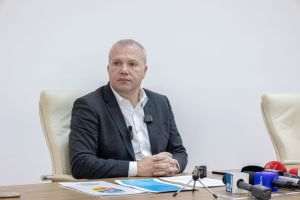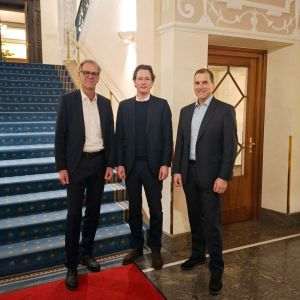• (Interview with Mr. Sebastian Vlădescu, the Minister of Public Finance)
• "Our goal is not to bring pensions and salaries in the public sector back to their current levels, but rather to restructure public spending by setting new compensation levels and to balance the pension system"
• "Private management of state owned companies?" Privatization would be better!"
Reporter: Minister, reducing spending in companies that are losing money is reasonable, but not enough. What are the steps towards covering the rest of the budget deficit, which would allow us to return to the current wage levels later down the road, perhaps even increase them?
Sebastian Vlădescu: We don"t intend to return to the current system. The current wage levels are the system itself. We are currently working on a new law of unified wages, which will require new compensation steps, new classifications of public sector employees, the narrowing of the spread between the lowest and the highest wages in the public sector, and I hope this law will come into effect next year. This new law will include the levels of wage expenses in the public sector in the year 2011.
According to the agreement with the IMF, the amount allocated for wages in the public sector will be 39 billion lei, for a set number of employees. After that, the law of fiscal responsibility contains clear details on how much public spending will increase from one year to the next, and I hope that the other governments that will come down the road will abide by that law. Concerning pensions, next year we will have a new law of pensions, which says that after a certain period of time, the system will become balanced, according to our estimates.
Reporter: You mean public sector workers will no longer earn what they used to? I mean, will their wages and pensions go down and they should not expect any more raises this year or next year?
Sebastian Vlădescu: There may be some increases, but this will be in different proportions, based on other laws. So we will never go back and tell those who took a 15% or 25% cut , "OK, we are now going to give you back 15% or 25%". There will be a new law and everyone will have a new position, they will be located on a different rung of the ladder.
Reporter: The thing that concerned people the most were pensions. This is where they fear that these percentages will be applied indiscriminately, including to farmers" pensions...
Sebastian Vlădescu: Social pensions and farmers" pensions are generally minimal. We have currently announced that no one will go below the minimum wage of 600 lei and we are reviewing the possibility of keeping the minimum pensions at 350 lei.
Reporter: But will you raise taxes for other types of pensions or will you in effect cut them?
Sebastian Vlădescu: It will be a cut, not a tax increase. We will cut 15% for everyone.
Reporter: President Băsescu said that once "great employees" in the public sector, once they see their wages go down 25%, would perhaps turn to medium and small enterprises, where they may get better salaries. What other measures are there to stimulate the business environment, to allow it to absorb the people leaving the public sector?
Sebastian Vlădescu: At this moment, there are no new, brilliant measures to stimulate the private environment.
The first measure to support the private business environment was that we didn"t raise taxes.
Reporter: Some say it"s not enough. They did cheer for the fact that you didn"t raise the flat tax rate and the VAT, because they said that this would allow businesses to stay afloat, even following the expected drop in purchasing power, but businesses want more ...
Sebastian Vlădescu: The next thing that the business environment is waiting for is a solution for getting money from the state, one way or the other. The state currently has no money available for guarantee schemes, other than the ones that are "off budget" and we will also set up some guarantee schemes, but businessmen aren"t exactly showing too much interest in these schemes.
But we will do this, because we do have minimum required levels, especially for European funds, and to support those who win projects financed with European funds. But at the moment, there are no plans to provide state aids or to stimulate consumption.
Reporter: I noticed that you do provide some reimbursement facilities...
Sebastian Vlădescu: There will be some reimbursement facilities, there will be money that will go towards paying off old debts.
Reporter: Will government guarantees for troubled state-owned companies be raised compared to last year? I noticed that the Mangalia shipyard has already applied for government guarantees.
Sebastian Vlădescu: Already the amounts allocated for state guarantees are higher than last year. In this respect, we will support investors, the state aid schemes will continue to operate and we will enhance them, things are going forward in this area.
I repeat, it"s a good thing to play fair. We have adjusted spending, but it is still high. We still have an agreed deficit of 6.8% of the GDP at the moment. Using those funds we will succeed covering some of the current expenses, including paying some of last year"s debts as mentioned, including in the Healthcare sector, and, perhaps launch some investment programs, but on a far lower scale, but which would receive only a few hundred million Euros.
Reporter: Going back to the business environment, how will you help stimulate companies to grow so they can absorb people leaving the public sector, and at the same time increase budget receipts. Are you considering any fiscal relaxation measures? Some experts came up with concrete proposals backed by numbers.
Sebastian Vlădescu: At this moment, it is out of the question to cut taxes, we just avoided raising taxes, so it"s too early to think about cutting them.
Reporter: And is there the possibility of a fiscal amnesty at this moment?
Sebastián Vlădescu : There will be no fiscal amnesty, at least not while I"m here.
Reporter: Minister, there are funds that need to be recovered quickly and invested. I have one such example - The Proprietatea Fund is sitting on a boatload of money...
Sebastian Vlădescu: What it"s sitting on is a lot of stock...
Reporter: That is true, but the state can"t earn its dividends, we are talking hundreds of millions of Euros, due to a legislative flaw...
Sebastian Vlădescu: I have sent this issue to the Parliament and they are reviewing it.
Reporter: Yes, but it"s stuck in the Budget and Finance commission...
Sebastian Vlădescu: I will go to the Budget and Finance commission to get over this deadlock. I have basically discussed with the parliamentaries and they agree with the needed amendments of the law in order to solve the issues of capital, dividends, litigations and other issues...
Reporter: Other untapped sources of revenue, which were mentioned to us by our readers, are precisely the state owned companies that have outstanding debts to the public budget. Right now, in the state budget, several major companies owned by the state owe 2.5 billion lei to the public budget. People are asking why you don"t replace their managers with more competent ones, which would adopt business plans for making these companies profitable ... and cause their arrears to drop. And if their managers appointed by the state don"t do well, why not do like you did with the Proprietatea Fund, and appoint private managers to helm those companies.
Sebastian Vlădescu: The number of companies that are generating losses is decreasing and the agreement with the IMF only specifies ten such companies...
Reporter: Yes they are being monitored, but in spite of their monitoring by the IMF, their arrears to the state budget are increasing...
Sebastian Vlădescu: I doubt (and I"m speaking from my own private experience) that there is anyone who could make CFR Călători (passenger division of the Romanian Railways) or CFR Marfă (freight division of the and make them more efficient...
Reporter: But the Romanian Railway Company is a monopoly, what"s preventing it from being more efficient?
Sebastian Vlădescu: It"s only CFR Călători that is a monopoly, CFR Marfă is not a monopoly. The problem is the price/value ratio that passengers can afford to pay in the case of CFR Călători.
Reporter: Perhaps CFR Călători is not the best example.
Sebastian Vlădescu: Give me another then.
Reporter: I have two - The National Salt Company or the National Road Company.
Sebastian Vlădescu: The first is a minor company. And under no circumstances will any businessman be able to improve the National Road Company.
Reporter: Then perhaps the National Coal Company whose debts increase every three months. Six of the ten companies that you said were being monitored by the IMF saw their arrears increase...
Sebastian Vlădescu: Yes, but they are companies that will disappear. Some of them are included on the list of companies to be privatized by March next year.
Reporter: Is it certain that in March 2011 CFR Marfă will be privatized?
Vlădescu: The deadline is specified in the letter of intent of the Ministry of Transports. Concerning "Termoelectrica", which still has the same debts, it will have to be liquidated because all that"s left of it is an empty shell.
Reporter: Will it be absorbed?
Sebastian Vlădescu: Not even that. It still has three or four plants which will enter partnerships with private investors. "Termoelectrica" is an entity that has accounted for most of the arrears of the public sector over the course of the last 15 to 20 years, so it is inconceivable that any businessman could modernize and improve the profitability of Termoelectrica.
Reporter: So you don"t think that private management could work in public companies?
Sebastian Vlădescu: Yes, privatization means private management...
Reporter: Yes, but we meant having the state retain ownership of these companies but with them having private managers....
Sebastian Vlădescu: Why remain state owned and be led by private managers? Let them be privatized and have those investors manage them better.
Reporter: But until then, what do we do with the Coal Company, for instance?
Sebastian Vlădescu: Subsidies will expire next year, it is specified in the letter of intent that starting with January 1st the subsidies will expire, and then there will be an "exit strategy".
Reporter: There are some state owned companies for which this 25% cut does not apply, and you were talking about a solidarity fee.
Sebastian Vlădescu: The agreement with the IMF and the current discussion does not concern companies, but rather budget spending. It was initiated on a government level and when a decision is made you will be notified.
Reporter: Mr. Jeffrey Franks, the head of the IMF mission, talked about 250,000 layoffs over time, not right away.
Sebastian Vlădescu: Yes, he did say these layoffs would be done in time, not right away.
As I said, there is a plan to cut salary expenses in the public sector, together with the reorganization of the sector which will mean savings on jobs and lower expenses. It is a process which is under way and will continue.
Reporter: Mr. Franks also said that he underestimated the impact of the crisis in Romania, he didn"t expect it to be so severe.
Sebastian Vlădescu: We both agree on that. No one predicted the impact of the crisis all over the world, not just in Romania, but all over the world. There isn"t anyone who could tell at the moment what stage of the crisis we are in. What I know is that we need to be extremely careful. The world is in crisis, we don"t know how severe that crisis is and it would be advisable to be cautious. We will continue to be cautious.
Reporter: If you were a businessman, what rating would you give the current program of the Government?
Vlădescu: You"re asking me a very delicate question because I participated in the elaboration of this program... I can"t answer that question.
Reporter: Thanks for your interview!




























































